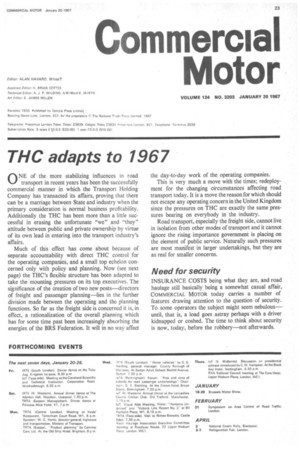THC adapts to 1967
Page 25

If you've noticed an error in this article please click here to report it so we can fix it.
0 NE of the more stabilizing influences in road transport in recent years has been the successfully commercial manner in which the Transport Holding Company has transacted its affairs, proving that there can be a marriage between State and industry when the primary consideration is normal business profitability. Additionally the THC has been more than a little successful in erasing the unfortunate "we" and "they" attitude between public and private ownership by virtue of its own lead in entering into the transport industry's affairs.
Much of this effect has come about because of separate accountability with direct THC control for the operating companies, and a small top echelon concerned only with policy and planning. Now (see next page) the THC's flexible structure has been adapted to take the mounting pressures on its top executives. The significance of the creation of two new posts—directors of freight and passenger planning—lies in the further division made between the operating and the planning functions. So far as the freight side is concerned it is, in effect, a rationalization of the overall planning which has for some time past been increasingly absorbing the energies of the BRS Federation. It will in no way affect the day-to-day work of the operating companies.
This is very much a move with the times; redeployment for the changing circumstances affecting road transport today. It is a move the reason for which should not escape any operating concern in the United Kingdom since the pressures on THC are exactly the same pressures bearing on everybody in the industry.
Road transport, especially the freight side, cannot live in isolation from other modes of transport and it cannot ignore the rising importance government is placing on the element of public service. Naturally such pressures are most manifest in larger undertakings, but they are as real for smaller concerns.
Need for security
INSURANCE COSTS being what they are, and road haulage still basically being a somewhat casual affair, COMMERCIAL MOTOR today carries a number of features drawing attention to the question of security. To some operators the subject might seem nebulous— until, that is, a load goes astray perhaps with a driver kidnapped or coshed. The time to think about security is now, today, before the robbery—not afterwards.




























































































































